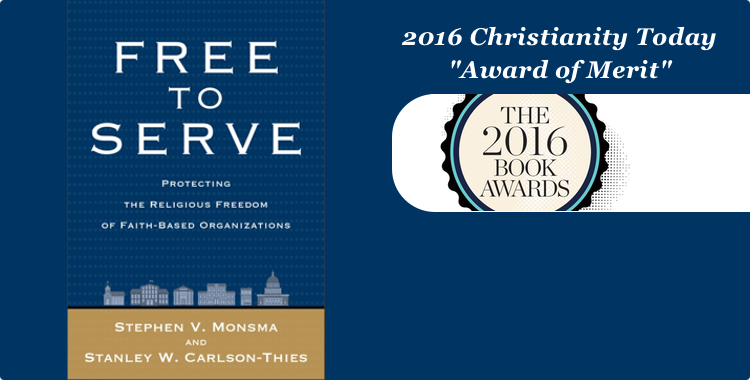
Free to Serve is “An Important Book for Our Times”
by Chelsea Langston
Free to Serve: Protecting the Religious Freedom of Faith-Based Organizations (Brazos Press) made an immediate splash when it was published in October, 2015. In this book, Stephen Monsma, a founding board member of IRFA, and Stanley Carlson-Thies, IRFA’s founder, explore the challenges faith-based service organizations from various sectors—healthcare, education, social services, international humanitarian aid—face in serving in distinctively faith-shaped ways. The book advocates institutional pluralism: promoting the thriving of diverse organizations, of different faiths or no faith, to meet the needs of an increasingly diverse society.
Free to Serve’s emphasis on advancing institutional diversity and protecting the rights of organizations of all faiths sets it apart from other writings on religious freedom. This focus has resonated with many. Even before it was officially released, Free to Serve was featured as the top story on Christianity Today’s website.
The book provides real-life examples of how religion, for varied faith-based institutions as well as religious people, cannot be relegated to just a matter of private worship. Religion for a vast myriad of these people and faith-based organizations is a way of being, core to their identity. However, this reality is not accepted by many in our society. As co-author Stephen Monsma says in the Christianity Today article,
“One very basic assumption [of opponents of institutional religious freedom] is that when faith-based organizations provide public services—addiction treatment, college education, or overseas relief and development—they have somehow left religion behind and are now engaged in secular activities. If this is true, you can regulate these organizations without really violating their religious freedom. Religion, under this assumption, is something that takes place within churches, synagogues, and mosques, not when religious people form organizations to live out their faith in public.”
Part of this book’s appeal is its compelling case that faith transcends the individual, the private, and explicitly religious activities. Free to Serve demonstrates this through examples of the tangible ways in which faith-based organizations are practicing their faith when they care for the elderly, meet the physical needs of homeless youth, provide jobs training programs, and in so many other ways.
In December, 2015, Free to Serve was given the Award of Merit in the Politics and Public Life category of the Christianity Today 2016 Book Awards. This is an especially significant honor for Carlson-Thies and Monsma because 2015 was a year in which religious freedom became a front-and-center issue in the media and with politicians. As Hunter Baker, university fellow at Union University and author of The End of Secularism, states with regard to the award:
“Monsma and Carlson-Thies speak to the most pressing crisis in US politics. With regard to same-sex marriage and many other contested issues, religious liberty is on a collision course with prevailing moral and legal sensibilities, posing immediate dangers to Christian institutions. The authors address the problem with well-calibrated expertise. Religious liberty desperately needs defending as a matter of public policy, and Free to Serve shows how it’s done.”
In 2016, IRFA hopes Free to Serve continues to shape public conversation and to equip the leaders and the boards of faith-based organizations so that they can continue to do what they have always done: serve others in God’s name. Free to Serve has the unique capacity to reach audiences at all points of the political spectrum: it educates those who do not understand why faith-based organizations need to have the capacity to serve in distinctive ways while also showing religious people why it is so important to protect the rights all religious individuals and institutions, not just their own. As Richard Stearns, president of World Vision, states:
“This book explains how religious institutions caring for our communities risk losing their character as faith-based organizations. We have to protect the rights of everyone in our society if we are to protect the rights of anyone. An important book for our times.”
For more information about the book, endorsements, and quick links to booksellers, visit the book’s website.
The book is available at a bulk discount for faith-based organizations and their boards and for other organizations that champion religious freedom. Contact IRFA for further information.
